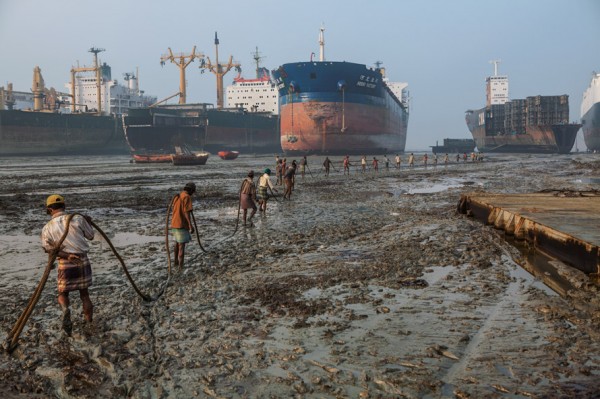Notes
A Rising Tide Lifts All Boats … and Other Modern Myths
These workers are hauling a 10,000-pound cable to a beached ship at one shipbreaking yards in Bangladesh. The photograph is part of a story at National Geographic on The Shipbreakers, which documents the dangerous working conditions and high profit margins that are business as usual in Bangladesh’s maritime demolition industry.
These shipyards are not exactly case studies in either worker safety or environmental protection, but they are marvels of recycling. Enormous cargo vessels are striped of everything that can be carted off, and then cut to pieces so that the steel can be rerolled. You’ve got to admire the extent to which the market can motivate additional use of industrial waste, and generate income all along the redistribution chain as it does so. At some point perhaps the margins are such that demolition would not be profitable, but obviously we are not there yet as business is booming. And workers are getting poisoned, maimed, and killed. Even if the country is better off having these jobs, it also remains poor enough that unionization is not a likely option. Obvious questions arise about just how amoral capitalism should be. Are we really supposed to believe that these men–and boys–couldn’t be treated better? Data presented in the article suggest that the industry can succeed in other countries with better regulation, but for the most part the prevailing international attitude remains the same: let the worker beware.
Up to this point, this post has been following the line of the National Geographic story, and particularly its logic of documentary photography on behalf of social reform. The photograph is their signature image for the story, and it serves the documentary purpose admirably. But it caught my eye for other reasons as well. It is more than another image of substandard working conditions. The image documents something else as well: the shift in modernism from a utopian to a dystopian trajectory.
To see what I mean, think back to the many images we have seen of ships, buildings, and other marvels of modern technology. There are at least three characteristics of most of those images that are pertinent here: the technological marvels are displayed when they are new, and as engines of progress, and as if they are controlled by their designers and operators. There are exceptions to this optic, of course, but these are examples of the occasional mishap–the ship that ran aground or the plane covered with fire retardant foam because it went off the runway–not metaphors of a global distribution of wealth and poverty.
Now look at the photograph again. The ships are old, beached, and yet looming over the workers below. Even in their decrepitude, they seem to be the masters, and the men on the chain gang their slaves. That would be a mystification, of course, but it points toward another form of invisibility: the owners of the yard, who are the masters, are not seen here (or in any of the photographs in the story, which were taken despite the company’s ban on photography.) Enough is being revealed, however: the muck that mires and tires the men, the long expanse showing the many ships and the sea that will bring many more (not the rare exception, but the new normal), and above all the sheer magnitude of the steel hulks, which clearly are worth more and objects of greater interest than the men below.
Ironically, the demolition business may be a triumph of sorts for modern economics, but the photograph reveals a larger problem. Modern technologies and economic development are as powerful as ever, but the idea that progress will bring prosperity to all may now be only a myth. An idea that is being dismantled day by day–and if not in your neighborhood, that doesn’t mean it isn’t happening.
— Robert Hariman
(cross-posted from No Caption Needed.)
(photo: Mike Hettwer/National Geographic)



Reactions
Comments Powered by Disqus